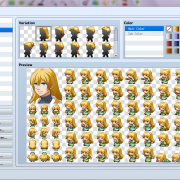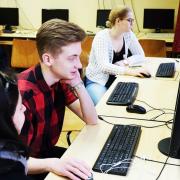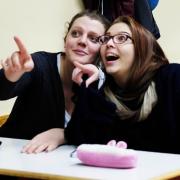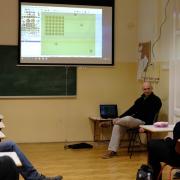Videogames have started to be used in the classroom with learning aims beyond fun and entertainment: they are not only tools to teach advanced logics, strategy, design, storytelling or programming but an obvious source of employability for learners: videogame industry is the number one creative industry in the world. However, what remains certainly unexplored is the possibility of guiding teachers and learners to create adapted videogames to their own needs for educational and training purposes. In order to help this process, CO-GAME proposes to take as a point of departure the historical context of a particular building or space close to the learners (involving social, cultural, political, economic, technological and, amongst all, civic aspects). History and common heritage are thus be seen as the close step to introduce the learners in videogame creation.
Implementation:
Research Studies
Partners research good practice examples, Eu and national standards for each one of the outputs as established in kick-off meeting.
CO-GAME generator curriculum
The outputs Civic Heritage descriptor, Videogame for VET production guide, Videogame for VET design guide, Qualifications assessment and Press-releaser are compiled in the CO-GAME generator curriculum. Partners redefine the results, under CEPS lead, to implement it as a blended course (elearning and presential training) and as an Open Educational Resource (OER) for the train the trainers and the creation of modules.
Train the trainers
Development of the Module for train the trainers for creating videogames in VET. Once the Co-Game generator curriculum is approved, contents will be developed to the train the trainers action to be implemented during 5 days in Budapest, addressed to 10 VET professionals- 2 per partner. They will be organized as an OER, able to be used by other stakeholders. After this action, an Steering Committee will also be held and partners discuss implications and findings resulting from the already developed outputs, evidences of the Train the Trainer course and decide how to proceed with the development of national activities and the 5 local training modules for learners. Decision on how to implement the educational module and the workplan monitoring this activity. Future planning of multiplier events.
Development of the Modules pack for videogame creation inspired in different historical periods
Each partner will develop its own module to be tested in training units according to the previously identified themes and will organize locally a training test unit of 30 hours for 15 participants each (gender balanced). Modules will become also OER to be used by each national language. Learners will create their own videogames and all the modules will be compiled in a digital pack able to be disseminated and transferred, available at the website and 3.0 Creative Commons licensed.
Communication and exploitation activities
Multiplier events will be held in every country to disseminate and exploit the developed products. Final international conference to discuss the outputs and findings of the project will be held in Barcelona. At the meeting, partners will discuss the findings of international multiplier event, project management, quality management, report on dissemination and other exploitation activities, identify all sustainable elements and wrap up the project in order to create the final report. International multiplier event will be also the launching moment for each one of the national multiplier events and the opportunity to show how outputs generated could be used in them.
Project partners:
CEPS – Projectes Socials – Spain (lead partner)
Berufsforderungsinstitut Oberosterreich - Austria
Laterna Magica - Hungary
Centro Informazione e Educazione allo Sviluppo -CIES onlus - Italy
Mundaneum - Belgium
National partners: Eötvös10 Cultural Center, Vörösmarty Mihály School, Eötvös Lóránd University, Hungarian Teachers Association, Nemesys Games
Year: 2015-2017












